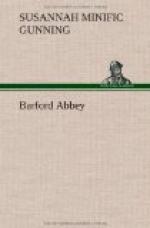Have patience, Madam, and I will,
Well, their dress?—Why their faces were dress’d in smiles of love:—Nature’s charms should always take place of art.—You see with what order I proceed.
Lord Darcey was dress’d in white richly lac’d with gold;—Lady Darcey in a white lutestring negligee nounc’d deep with a silver net;—no cap, a diamond sprig; her hair without powder; a diamond necklace and sleeve-knots;—bracelets set round with diamonds; and let me tell you, her jewels are a present from my first Adorable;—on the knowledge of which I discarded him.—No, no, Mr. Morgan; you are not a jewel of yourself neither.—Lady Darcey would have wore quite a morning dishabille, if the vain old Gentleman had not requested the contrary:—so forsooth, to humour him, we must be all put out of our way.
There they are on the lawn, as I hope to live, going to invite in Caesar.—Only an old dog, Madam, that lives betwixt this house and the steward’s.
Lady Elizabeth and Mr. Molesworth, Lady Sophia and Captain Risby,—Oh, I long to be with you!—throw no more gravel to my window.—I will be dutiful;—in spite of your allurements, I will.
I left them in the library, inspecting a very charming piece, just brought from Brandon Lodge, done by the hand of Lady Mary Sutton.—Upon my word, they have soon conn’d it over:—but I have not told you it is the portraits of Mr. and Mrs. Powis;—my dear Dean too joining their hands.—
God defend me! there he is, hopping out.—I wish he had kept within.—Why, Sir, I should have been down in a moment: then we might have had the most comfortable tete-a-tete.
Seriously, Madam—now I am really serious—can you believe, after beholding Lord and Lady Darcey, I will ever be content with a moderate share of happiness?—No, I will die first.—To see them at this instant would be an antidote for indifference.—Not any thing of foolish fondness:—no; that will never be seen in Lord and Lady Darcey.—Their happiness is not confin’d:—we are all refreshed by it:—it pours forth from their homes like streams flowing from a pure terrain.—I think I said I could not go to church:—no, not for the world would I have gone:—I expected Miss Powis would be crying, fainting, and I know not what.—Instead of all this fuss, not a tear was shed.—I thought every body cried when they were married:—those that had, or had not cause.—Well, I am determin’d to appear satisfied, however, if the yoke is a little galling.
How charming look’d Miss Powis, when she smil’d on Lord Darcey!—On Lord Darcey? On every body I mean.—And for him—But I must forget his air,—his words,—his looks, if ever I intend to say love, honour, and obey.—Once I am brought to say love,—honour and obey will slide off glibly enough. I must go down amongst them. Believe me, Madam, I shut myself up to write against intreaties,—against the most persuasive eloquence.




